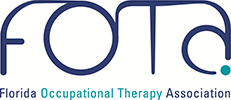COVID-19 AND THE IMPACT ON OT AND OTA FIELDWORK
By: Kim Dudzinsk MS, OTR/L & Angela Sampson OTR/L
This is an unprecedented time in healthcare. The COVID-19 pandemic has changed the world for all healthcare practitioners, including occupational therapists and occupational therapy assistants. Across the country, many skilled nursing facilities and hospitals are limiting their participation in occupational therapy student fieldwork rotations, as they seek to limit possible exposure of the COVID-19 virus to their patients. Outpatient clinics are experiencing a decrease in productivity as patients cancel their therapy sessions due to mandated stay-at-home orders. Pediatric clinics are turning to a model of telehealth, as schools are closed down and family schedules are up in the air. As fieldwork coordinators across the country scramble to find facilities willing to work with students in the middle of this pandemic, many students worry they may not be able to fulfill their graduation requirements with the limited number of fieldwork opportunities currently available.
Once this pandemic passes, there will be a surplus of occupational therapy students ready to jump in and volunteer to help so they can meet their fieldwork requirements. Current federal mandates have allowed for changes in the didactic portion of academic programs, such as transitioning to online teaching methods, but clinical fieldwork education has not been modified or shortened. Students are still required to complete a minimum of 16 weeks (OTA) or 24 weeks (OT) of clinical rotations in two different fieldwork settings.
Some OT practitioners may feel that supporting student fieldwork while trying to recover from a pandemic may not be a high priority. However, practitioners should recognize that the need to support student education will still be present. Once the COVID-19 virus pandemic comes to a close, it is imperative that occupational therapists join together as a community and support the future of the profession. Having OT students present and assisting with the rebuilding process as clinics start to re-open their fieldwork programs will benefit both practitioners and students alike. Students can be engaged in program re-development projects and keep practitioners up-to-date with current and new practice, especially in technology-driven areas such as telehealth models. Many clinical fieldwork educators have reported that having students in their facilities brings positive energy and enthusiasm to the workplace environment, which may be needed after this stressful and chaotic time. In addition, students provide a helpful extra set of hands as practitioners handle busier than normal caseloads in their attempt to get patients caught up on therapy sessions that may have been missed during the pandemic. Practitioners should also keep in mind that supervising students enables them to receive free continuing competency units that can be applied towards their licensure and certifications; an especially important benefit right now, as the AOTA conference and many other continuing education opportunities have been cancelled. Most importantly, supervising students is intrinsically rewarding. Clinical fieldwork educators will enjoy a feeling of satisfaction in giving back to the profession and shaping the future of occupational therapy, which happens to be especially important during a challenging time such as this.
Are you ready for the challenge of supporting student fieldwork after this pandemic passes? If so, contact the academic fieldwork coordinators at your local universities to see how you can support their fieldwork programs.
Kim Dudzinski, MS, OTR/L Academic Fieldwork Coordinator Master of Occupational Therapy(O) 407-303-7747 X 1104729
(M) 407-463-0620
(F) 407-303-0871
